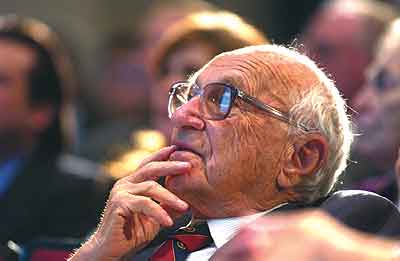 Chicago
Journal
Chicago
Journal
Birthday party for a
revolutionary
To celebrate the ideas
and influence of Milton Friedman, Chicago threw—what
else?—an economics conference.
The same man who skewered the anticompetitive
practices of the American Medical Association and attacked
rent control was present at the creation of the federal
income-tax withholding system during World War II. Then
Milton Friedman, AM'33, fresh from stints with the National
Bureau of Economics Research (NBER), the Department of the
Treasury, and Columbia University's Statistical Research
Group, joined Chicago's economics faculty in 1946.
Over the next 30 years he revitalized
monetary theory, publishing Studies in the Quantity Theory
of Money (1956), A Theory of the Consumption Function
(1957), and the seminal A Monetary History of the United
States, 1867-1960 (1963, cowritten with the NBER's Anna
J. Schwartz). In the words of his former Chicago colleague
Gary S. Becker, AM'53, PhD'55, Friedman became "simply
the greatest economist of the 20th century."
 Photograph
by Dan Dry Photograph
by Dan Dry |
|
More
than a face in the economics crowd: Milton Friedman,
AM'33, at 90.
|
And so on November 8 more than 450 economists,
government officials, policy makers, students, and other
fans participated in what the economics department billed
as "A Conference to Honor Milton Friedman, the Paul
Snowden Russell Distinguished Service Professor Emeritus,
on the Occasion of his Ninetieth Birthday." Friedman
actually turned 90 on July 31, but if the conference was
not the first event marking his nonagenarian status, it
was the only event dedicated to exploring the 1976 Nobel
laureate's work and its continuing influence and implications.
Seated front and center in Max Palevsky
Auditorium—and mobbed by autograph seekers during
the breaks—were Friedman and his wife and research
partner, Rose Director Friedman, PhB'32. Their side-by-side
seating, Chicago president Don M. Randel noted in his welcoming
remarks, recalled the couple's first day on campus, when
alphabetical order brought them together in Jacob Viner's
Economics 301: Price and Distribution Theory. They went
on to coauthor theories, articles, and books, including
Free to Choose (1980).
During sessions built around Friedman's
contributions to macroeconomic thought, theory, and policy,
a standing-room-only audience that included former Secretary
of State George Schultz and a virtual who's who of contemporary
economists enjoyed scholarly give-and-take. John B. Taylor,
undersecretary for international affairs in the U.S. treasury
department, discussed "Monetary Policy in the Post-War
Economy." James J. Heckman, the Henry Schultz distinguished
service professor in economics, led a panel on incentives
and policy, while Harvard economist Carolyn Hoxby gave a
lunchtime talk on educational choice and school vouchers.
(Although Friedman insisted that the idea of school vouchers
didn't originate with him but rather founding father Thomas
Paine, the Friedmans have long been proponents of a voucher
system, establishing the Milton and Rose D. Friedman Foundation,
devoted to school choice.)
The afternoon sessions began with a panel
on Friedman's theory of permanent income (whatever the variations
in their incomes, consumers will try to average out their
patterns of consumption), moderated by economics chair Lars
Peter Hansen. The final session, "Depression and Recovery,"
moderated by U of C economist Robert E. Lucas Jr., AB'59,
PhD'64, focused on Friedman and Schwartz's contention, voiced
in A Monetary History of the United States, that
the Federal Reserve Board's post-1929 monetary policy, rather
than bringing the nation out of the Depression, actually
slowed recovery. Concluding his remarks, Ben S. Bernanke,
a Princeton economist who joined the U.S. Federal Reserve
System's board of governors in August 2002, addressed Milton
directly: "You're right. We did it. And we're very
sorry." As the audience's laughter subsided, Bernanke
continued, "But, thanks to you, we won't do it again."
Then UCLA economist Lee E. Ohanian walked
the audience through overheads of equations built to quantify
the effects that Friedman and Schwartz saw as the outcome
of the New Deal policies. Ohanian was followed by Schwartz
herself, who delivered a quick but blow-by-blow analysis
of Ohanian's research. The Q&A period took on the air
of a Chicago workshop (Friedman, by the way, established
the still thriving Workshop in Money and Banking in 1953),
and a good time was had by all.
The day ended with dinner at the Quadrangle
Club. After praise from a trio of economists—Martin
Feldstein of Harvard and the NBER, Allan Meltzer of Carnegie
Mellon, and Gary Becker—the diminutive Friedman stood
up, just to the podium's right. Voice and smile strong,
he thanked everyone for creating an "overwhelming"
occasion. Then he told about the time he almost left Chicago
for an institution in a warmer clime. "Rose, who always
gives me good advice," he said, "urged me to go.
But because of the quality and the spirit and the attitude
of the economics department and the institution at large,"
he stayed on. Free to choose, he'd chosen Chicago. The applause
was loud and genuine.
— M.R.Y.


![]() Contact
Contact
![]() About
the Magazine
About
the Magazine ![]() Alumni
Gateway
Alumni
Gateway ![]() Alumni
Directory
Alumni
Directory ![]() UChicago
UChicago![]() ©2002 The University
of Chicago® Magazine
©2002 The University
of Chicago® Magazine ![]() 5801 South Ellis Ave., Chicago, IL 60637
5801 South Ellis Ave., Chicago, IL 60637![]() fax: 773/702-0495
fax: 773/702-0495 ![]() uchicago-magazine@uchicago.edu
uchicago-magazine@uchicago.edu
 Photograph
by Dan Dry
Photograph
by Dan Dry